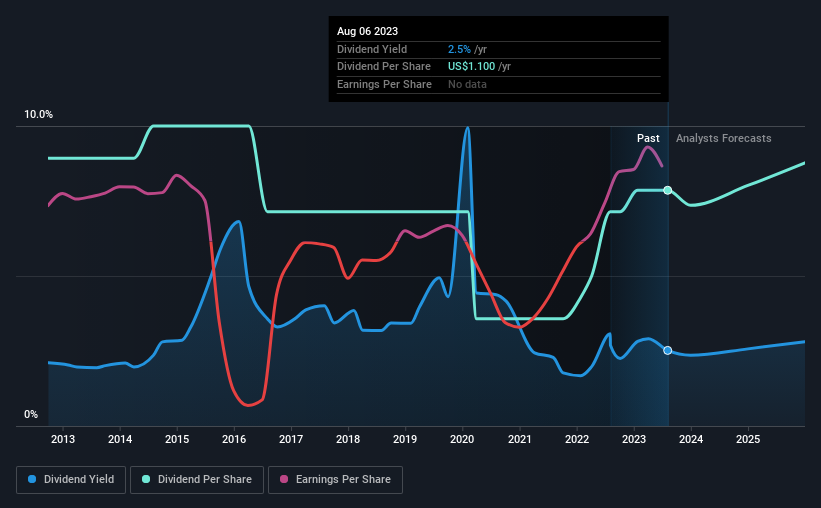Murphy Oil Corporation (NYSE:MUR) Passed Our Checks, And It's About To Pay A US$0.28 Dividend
Some investors rely on dividends for growing their wealth, and if you're one of those dividend sleuths, you might be intrigued to know that Murphy Oil Corporation (NYSE:MUR) is about to go ex-dividend in just 4 days. The ex-dividend date is one business day before a company's record date, which is the date on which the company determines which shareholders are entitled to receive a dividend. The ex-dividend date is an important date to be aware of as any purchase of the stock made on or after this date might mean a late settlement that doesn't show on the record date. Meaning, you will need to purchase Murphy Oil's shares before the 11th of August to receive the dividend, which will be paid on the 1st of September.
The company's next dividend payment will be US$0.28 per share, and in the last 12 months, the company paid a total of US$1.10 per share. Based on the last year's worth of payments, Murphy Oil has a trailing yield of 2.5% on the current stock price of $43.66. If you buy this business for its dividend, you should have an idea of whether Murphy Oil's dividend is reliable and sustainable. We need to see whether the dividend is covered by earnings and if it's growing.
Check out our latest analysis for Murphy Oil
Dividends are typically paid from company earnings. If a company pays more in dividends than it earned in profit, then the dividend could be unsustainable. Murphy Oil has a low and conservative payout ratio of just 16% of its income after tax. Yet cash flows are even more important than profits for assessing a dividend, so we need to see if the company generated enough cash to pay its distribution. It paid out 22% of its free cash flow as dividends last year, which is conservatively low.
It's positive to see that Murphy Oil's dividend is covered by both profits and cash flow, since this is generally a sign that the dividend is sustainable, and a lower payout ratio usually suggests a greater margin of safety before the dividend gets cut.
Click here to see the company's payout ratio, plus analyst estimates of its future dividends.
Have Earnings And Dividends Been Growing?
Stocks in companies that generate sustainable earnings growth often make the best dividend prospects, as it is easier to lift the dividend when earnings are rising. If business enters a downturn and the dividend is cut, the company could see its value fall precipitously. That's why it's comforting to see Murphy Oil's earnings have been skyrocketing, up 37% per annum for the past five years. With earnings per share growing rapidly and the company sensibly reinvesting almost all of its profits within the business, Murphy Oil looks like a promising growth company.
Many investors will assess a company's dividend performance by evaluating how much the dividend payments have changed over time. Murphy Oil has seen its dividend decline 1.3% per annum on average over the past 10 years, which is not great to see.
The Bottom Line
Has Murphy Oil got what it takes to maintain its dividend payments? Murphy Oil has grown its earnings per share while simultaneously reinvesting in the business. Unfortunately it's cut the dividend at least once in the past 10 years, but the conservative payout ratio makes the current dividend look sustainable. There's a lot to like about Murphy Oil, and we would prioritise taking a closer look at it.
So while Murphy Oil looks good from a dividend perspective, it's always worthwhile being up to date with the risks involved in this stock. Case in point: We've spotted 2 warning signs for Murphy Oil you should be aware of.
Generally, we wouldn't recommend just buying the first dividend stock you see. Here's a curated list of interesting stocks that are strong dividend payers.
Have feedback on this article? Concerned about the content? Get in touch with us directly. Alternatively, email editorial-team (at) simplywallst.com.
This article by Simply Wall St is general in nature. We provide commentary based on historical data and analyst forecasts only using an unbiased methodology and our articles are not intended to be financial advice. It does not constitute a recommendation to buy or sell any stock, and does not take account of your objectives, or your financial situation. We aim to bring you long-term focused analysis driven by fundamental data. Note that our analysis may not factor in the latest price-sensitive company announcements or qualitative material. Simply Wall St has no position in any stocks mentioned.

